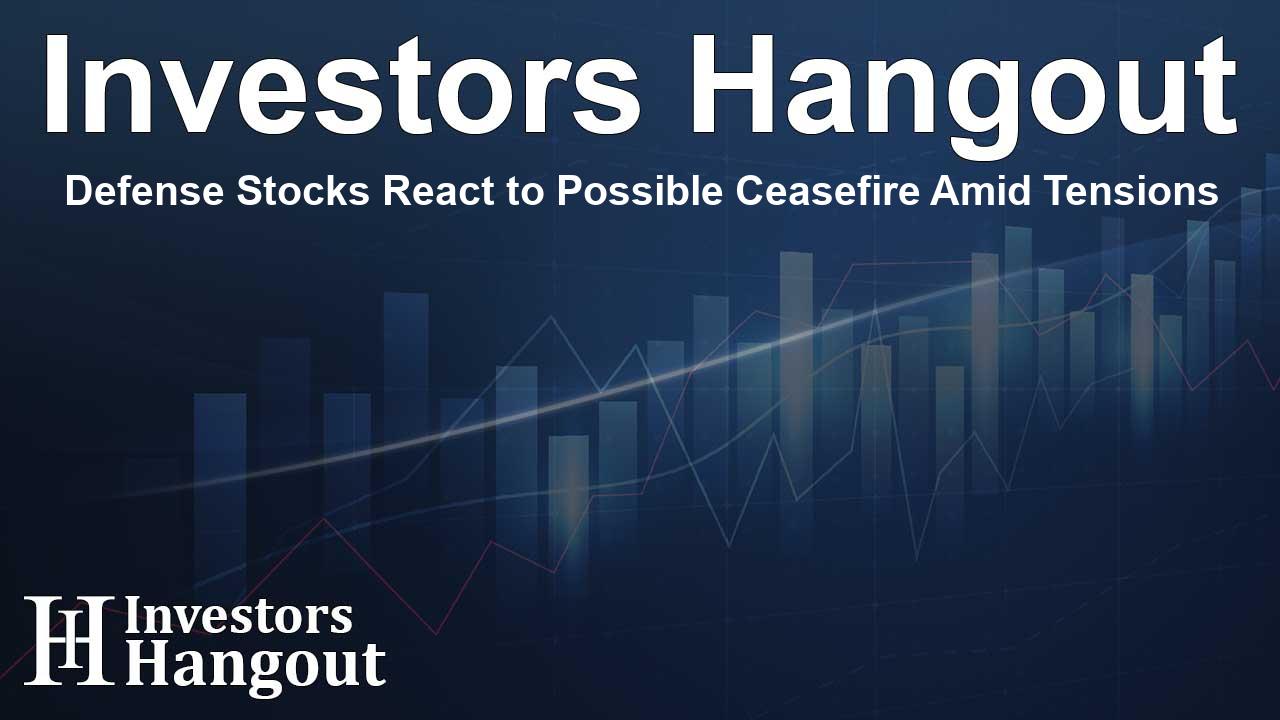Defense Stocks React to Possible Ceasefire Amid Tensions

Defense Stocks Experience Decline Amid Ceasefire Speculations
Recently, shares of major defense contractors like Lockheed Martin (NYSE: LMT), Northrop Grumman (NYSE: NOC), and Raytheon Technologies (NYSE: RTX) saw a downturn. The decline was particularly notable on a day filled with emerging reports that suggested a possible ceasefire agreement between Israel and Hezbollah. This news hints at a potential easing of regional tensions, which traditionally sparks fluctuations in the defense sector.
Market Reactions and Industry Dynamics
On the day in question, the S&P 500 Aerospace & Defense Industry Index noted a decline of up to 0.5%, contrasting with a modest rise of 0.1% in the broader S&P 500 index. Within the aerospace and defense sector, Lockheed Martin experienced a significant drop of 2.4%, while Northrop Grumman saw a decrease of 1.6%. They were not alone, as other companies such as Axon and L3Harris both faced declines of 1.1%.
Ceasefire News Impacts Market Sentiment
The fluctuating stock prices underscore how sensitive defense contractors are to global political developments. The possibility of a ceasefire stems from active diplomatic efforts led by an envoy from the outgoing Biden administration. Reports have indicated that Israel could reach an agreement with Hezbollah in a matter of days, although specifics remain unclear at this time.
Oil Prices and Broader Economic Indicators
In tandem with these developments in the defense sector, oil prices witnessed a notable drop of over $2 on the same day. The dip in oil prices is perceived as a direct response to the preliminary reports about the ceasefire. Senior U.S. officials have played a role in shaping these speculations, further showcasing how intertwined energy prices and geopolitical events can be in influencing market trends.
Broader Implications for Investors
The current situation raises questions about the future of defense investments. As geopolitical tensions fluctuate and potential resolutions surface, investors are urged to stay informed about how these dynamics may impact stock performance. Key players in the defense sector, like Lockheed Martin and Northrop Grumman, continue to be watched closely as new developments unfold.
Looking Ahead: What This Means for Investors
As we look ahead, it’s essential for investors to consider the broader implications of news such as a ceasefire agreement. A stabilization in the region could lead to reassessments in defense spending and contracts, impacting revenue for these companies. Lockheed Martin and Northrop Grumman, as industry leaders, will be pivotal in how the market pivots in response to these significant global events.
Conclusion
With the landscape of defense stock investments constantly shifting, understanding the interplay between geopolitical events and market movements is crucial. Investors should remain vigilant and responsive to these changes as they unfold.
Frequently Asked Questions
1. What triggered the decline in defense stocks recently?
The decline in defense stocks like Lockheed Martin and Northrop Grumman was primarily triggered by news of a potential ceasefire agreement between Israel and Hezbollah, signaling possible de-escalation in tensions.
2. How do geopolitical events affect defense contractors?
Geopolitical events significantly influence stock prices in defense contracting, as stability or escalations can affect government spending and contract approvals.
3. What are the stock symbols for the major defense contractors mentioned?
The stock symbols are Lockheed Martin (NYSE: LMT), Northrop Grumman (NYSE: NOC), and Raytheon Technologies (NYSE: RTX).
4. What was the market trend for the S&P 500 Aerospace & Defense Industry?
The S&P 500 Aerospace & Defense Industry Index fell by 0.5%, showing market reaction to the rumors of a ceasefire.
5. How might oil prices be related to defense stocks?
Oil prices and defense stocks are interconnected; fluctuations in oil prices can reflect broader market sentiments regarding geopolitical stability and conflict, which directly affects defense spending and investment decisions.
About Investors Hangout
Investors Hangout is a leading online stock forum for financial discussion and learning, offering a wide range of free tools and resources. It draws in traders of all levels, who exchange market knowledge, investigate trading tactics, and keep an eye on industry developments in real time. Featuring financial articles, stock message boards, quotes, charts, company profiles, and live news updates. Through cooperative learning and a wealth of informational resources, it helps users from novices creating their first portfolios to experts honing their techniques. Join Investors Hangout today: https://investorshangout.com/
Disclaimer: The content of this article is solely for general informational purposes only; it does not represent legal, financial, or investment advice. Investors Hangout does not offer financial advice; the author is not a licensed financial advisor. Consult a qualified advisor before making any financial or investment decisions based on this article. The author's interpretation of publicly available data shapes the opinions presented here; as a result, they should not be taken as advice to purchase, sell, or hold any securities mentioned or any other investments. The author does not guarantee the accuracy, completeness, or timeliness of any material, providing it "as is." Information and market conditions may change; past performance is not indicative of future outcomes. If any of the material offered here is inaccurate, please contact us for corrections.